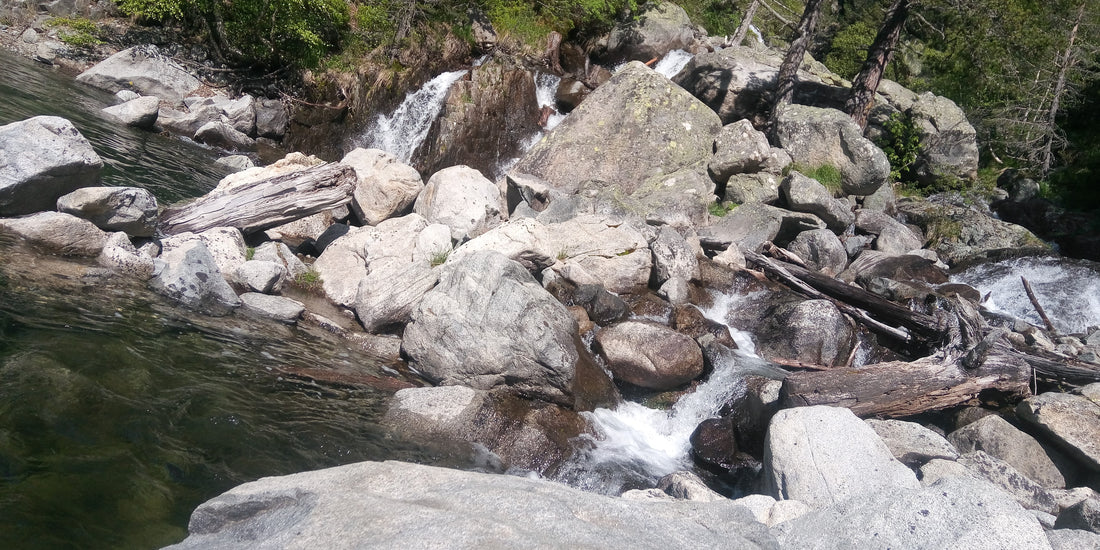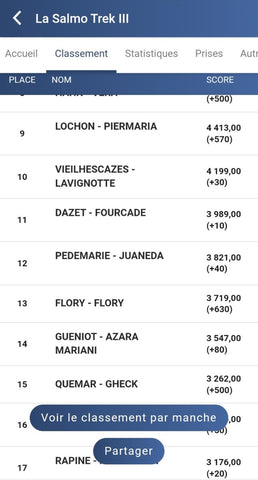
SalmoTreck 2023: a unique experience!
Share
(with the Pyrénées Leurres&Co team)
Interviewer: In this special edition of our blog, we take you on an extraordinary adventure through the Pyrenees. Our partner David and his companion Mathieu make us relive their very first participation in SalmoTreck 2023, a unique competition combining hiking, orienteering and wild trout fishing in the mountains. Prepare to dive into this thrilling experience that challenges the limits of endurance, orientation and passion for fishing.
First, can you introduce the team?
David: Of course! My name is David, I am 22 years old and I live near Pau. My passion for fishing began at the age of 8, under the tutelage of my father. We started with cork, then moved on to toc fishing. In 2016, I took a new step by introducing myself to lure fishing. As for my partner, Mathieu, he is a childhood friend who immersed himself in the world of fishing about 2 years ago. He quickly specialized in lure fishing, especially at altitude.

Interviewer: Great! Now, what were your objectives in participating in this extraordinary competition?
David: Well, the main idea was to share a mountain experience with friends. We also wanted to take advantage of this adventure to fish at high altitude, catch a few fish and experience unforgettable moments.
Interviewer: To succeed in such a competition, I suppose you had to prepare seriously?
David: Absolutely! Our preparation was intense. For a month and a half, we went hiking and fishing every weekend. We explored different regions, including high altitude lakes in the Pyrenees Atlantiques. Two weeks before the competition, we went to Néouvielle, to the actual venue of the event, to familiarize ourselves with the terrain. As for tackle, we opted for a variety of lures, mainly rippling spoons, but also soft lures and swimbaits, all fitted with single barbless hooks to preserve wild trout. As a precaution, we carried two lure rods each, in case one broke. To reduce the weight of our bags, we had a water filter bottle. As for our clothes, we can say that we chose lightness, with barely a pair of underwear for three days (laughs). In total, our bags weighed around 18 kg each, which was not negligible on such an event.
Interviewer: With such serious preparation, you must have been confident, right?
David: In reality, our confidence was tested the week leading up to the competition. Mathieu twisted his ankle and sprained it. Fortunately, he was able to see a doctor the day before departure, and we filled him with ointment. Then, everything came down to the mind, but we were far from calm at that moment.
Interviewer: How did the first day of the competition go? You finished 5th at the end of the day, that’s impressive!
David: The first day was quite intense. We followed the classic route, respecting the chronological order of the markers. Our route took us to the Lacs des Bastan, and from there we fished all the lakes on our right up to Lac de Gréziolles, where we spent the night. We started fishing around 4 p.m. and managed to catch 7 or 8 trout using mostly undulating spoons, while landing about ten fish and taking just as many small ones. Our strategy was based on the distance covered: walking as much as possible the first day to ensure a smoother return the next day, especially for Mathieu's ankle. Seeing us in 5th place in the evening in the tent really delighted us.


Interviewer: Did the second day go as well as the first?
David: Day two was a mix of emotions. In the morning, we stayed fishing on site in Gréziolles, where we caught 3 to 4 fish on the undulante.


Then we walked from 11 a.m. to 2 p.m. to reach Lake Arrédoun, where we took a well-deserved lunch break. During the afternoon, activity on the lake was quite low. We only managed to catch a pair of Arctic char using a large undulating spoon, while observing many fish following the lure without biting. We then reached Port Bielh Lake, where we managed to catch 2 trout, although one was rejected due to a size error, the balls!


Subsequently, we changed locations to fish in the small ponds between Port Bielh and Lac de l'Oule. Once again, the fish followed without attacking the lures. This is where we experimented with an innovative technique: luring them to the edge with an undulant and capturing them with a soft lure called “Redoutable”. We managed to catch 2 char and a trout this way! It was incredible!


As the fishing action was not very intense, we decided to go down towards Lac de l'Oule while fishing the streams with the "Redoutable" and the spinner. We managed to catch many small trout, but none were the right size. Once we arrived at Oule, we met the Gunki team, who informed us that there were almost no catches on the lake. We therefore decided to go to Orédon to save our strength for the next day's march. After a long walk, we reached the lake and camped for the night around 8 p.m. In the evening, I landed a big christivomer of over 40 cm with the undulating Flit 15g (dark pearly). This could have been the fish of the day, but luck was not on our side. Due to the weak network, the ranking could not be properly updated but from memory, we were 8th in the evening.
Interviewer: Was the morning attack in Orédon more successful than the evening one? Tell us!
David: The morning blow in Orédon turned out to be a big disappointment. We decided to fish at 6am, as the Illex team had managed to catch 2 fish the day before on the dam. However, contrary to our expectations, we didn't even get a single touch.
At 10:30 a.m. we made the decision to return to Lac de l'Oule while fishing the river during the descent. This turned out to be a major mistake on our part. The water was up to our knees, our shoes were soaked, and it took us almost 2 hours to get out of the gorge. At 1 p.m., we finally arrived at Lake Oule. We fished near the dam on the left side of the lake. Unfortunately, we landed 3 nice trout and I even caught a perch, which was quite surprising! Our strategy was to fish as much as possible on the lake to try to maintain our place in the top 10, but by 1 p.m. we were ranked 11th. We left the lake at 3 p.m. after catching 2 small trout in the stream to avoid returning empty-handed. This is how our first participation in this competition ended.

Interviewer: You finished 12th out of 71 teams, which is an excellent performance! What are your feelings about this?
David: Despite our disappointing performance on the final day, we are extremely happy with our ranking. Plus, there were some real talented anglers in the top 20, so it's an honor to be among them.

Interviewer: Strategically, would you do things differently next time.
David: Absolutely! Firstly, we should have known the sector better beforehand, which was strategically detrimental to us: we should not have wasted time on non-productive spots like Orédon or on the Oule, but rather only take the walking tests. . We also had to adapt fishing and walking to Mathieu's ankle problem, so we preferred to play it safe. Gear-wise, our bags were way too heavy, and we could have minimized the number of fish landed by using barbless treble hooks. It's all part of learning, and we will come back better prepared and stronger next year.
Interviewer: When you participate in this type of competition, I am sure that a well-oiled routine is established. Could you tell us more about yours?
David: Of course! Every day, our routine was the same: waking up at 5:30 a.m., folding the tent and eating cereal bars for breakfast, then leaving at 6 a.m. to go fishing. In the evening, around 10 p.m., we set up the tent, settled in, and had dinner around 11:30 p.m.

The hardest thing to deal with was our impatience during the competition. We had the impression of wasting time everywhere, even though we know that haste is not our ally. For example, for meals, we never ate at the same time, but one after the other to optimize fishing.
Interviewer: We haven't talked about the weather yet. How was she during the competition?
David: The first day the weather was terrible, with rain and fog. Perhaps this is why there was activity even during the day. Then the weather improved and became sunnier.

Interviewer: Finally, let's talk about your fishing equipment. What did you mainly use?
David: We fished exclusively with lures. We had rigged a fly rod, but it ended up being of no use other than adding weight to our gear. As far as lures are concerned, we used a lot of large 18 gram fluorescent wavers. However, the lures from the Pyrénées Leurres&Co team were also very effective. I would say we caught about half of our fish on the 15g Flit Wave in Pearl because it allowed us to slow down the retrieve speed. I want to mention the Redoutable soft lure, which allowed us to catch trout in broad daylight when nothing else seemed to trigger them. Its resemblance to real fish undoubtedly worked in its favor. After hitting a cristivomer on the undulating Flit at Orédon, we continued to insist with this lure, but perhaps we should have tried the Redoutable for its more realistic appearance, which could have been more attractive. We won't know for next time.
Interviewer: Thank you very much, David, for this fascinating sharing of experience! Your adventure at SalmoTreck 2023 was full of twists and turns, challenges and successes. Your careful preparation and perseverance paid off, even though a few obstacles stood in your way. Your 12th place finish out of 71 teams is a remarkable achievement, and it shows that you have the skills and determination to shine in this demanding field. We look forward to seeing how you prepare for next year's edition and what lessons you will learn from this experience. Thanks again for this interview, and we wish you all the best in your future fishing and competitive adventures!
